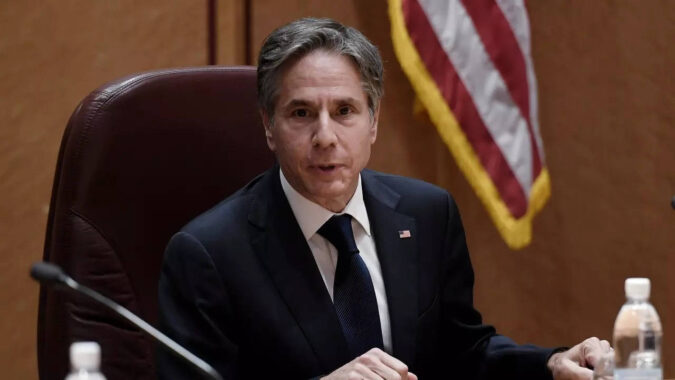WASHINGTON: US Secretary of State Antony Blinken has cautioned China against changing the status quo on Taiwan which is vital to maintaining peace and stability in the region.
Over the last few years, China has been trying to build military and economic pressure on Taiwan, Blinken said during a conversation with University of Chicago’s Institute of Politics Founding Director David Axelrod on Friday.
“On Taiwan, what we have seen over the last few years is, I think, China made a decision that it was no longer comfortable with the status quo, a status quo that had prevailed for decades, that had actually been successful in terms of the relationship between our countries and managing what is a difficult situation,” the secretary of state said.
pti
“We have seen them, over the last few years… ratchet up the pressure on Taiwan, military pressure, economic pressure, trying to cut off its ties to countries around the world, to international organisations,” he said.
From America’s perspective, that status quo has worked and it is vital to what is important to the US, which is maintaining peace and stability across the Taiwan Strait, he added.
Fifty per cent of container ships moving around the world every day go through the Taiwan Strait, 70 per cent or more of the computer chips manufactured in the world at the higher ends are manufactured in Taiwan. If this gets disrupted, the entire world economy will suffer, Blinken said.
“Every country in the world has an interest in making sure that peace and stability remain in the strait and that differences are resolved peacefully, not through pressure, not through coercion, and certainly not through the use of force,” he said in response to a question.
Blinken is scheduled to travel to Beijing next month.
“We’re in a competition. We have, I think, a moment in time, which we can also talk about, where we’re no longer in the post-Cold War era. There’s a competition to shape what comes next,” he said.
“China is a leading competitor and in many ways, the vision that they have for what the world should be and where it should go is not the same as the one we have. But competition is one thing, conflict is another. It is strongly in our interest to make sure that even as we compete very, very vigorously, we avoid… veering into conflict,” he said.
“One of the ways you do that is making sure that you actually have good lines of communication, that you are talking, that you are engaging, that you are putting some guardrails on the relationship, that you are putting a floor underneath it. That’s what the President (Biden) and President Xi were doing in Bali,” Biden said.
Over the last few years, China has been trying to build military and economic pressure on Taiwan, Blinken said during a conversation with University of Chicago’s Institute of Politics Founding Director David Axelrod on Friday.
“On Taiwan, what we have seen over the last few years is, I think, China made a decision that it was no longer comfortable with the status quo, a status quo that had prevailed for decades, that had actually been successful in terms of the relationship between our countries and managing what is a difficult situation,” the secretary of state said.
pti
“We have seen them, over the last few years… ratchet up the pressure on Taiwan, military pressure, economic pressure, trying to cut off its ties to countries around the world, to international organisations,” he said.
From America’s perspective, that status quo has worked and it is vital to what is important to the US, which is maintaining peace and stability across the Taiwan Strait, he added.
Fifty per cent of container ships moving around the world every day go through the Taiwan Strait, 70 per cent or more of the computer chips manufactured in the world at the higher ends are manufactured in Taiwan. If this gets disrupted, the entire world economy will suffer, Blinken said.
“Every country in the world has an interest in making sure that peace and stability remain in the strait and that differences are resolved peacefully, not through pressure, not through coercion, and certainly not through the use of force,” he said in response to a question.
Blinken is scheduled to travel to Beijing next month.
“We’re in a competition. We have, I think, a moment in time, which we can also talk about, where we’re no longer in the post-Cold War era. There’s a competition to shape what comes next,” he said.
“China is a leading competitor and in many ways, the vision that they have for what the world should be and where it should go is not the same as the one we have. But competition is one thing, conflict is another. It is strongly in our interest to make sure that even as we compete very, very vigorously, we avoid… veering into conflict,” he said.
“One of the ways you do that is making sure that you actually have good lines of communication, that you are talking, that you are engaging, that you are putting some guardrails on the relationship, that you are putting a floor underneath it. That’s what the President (Biden) and President Xi were doing in Bali,” Biden said.
